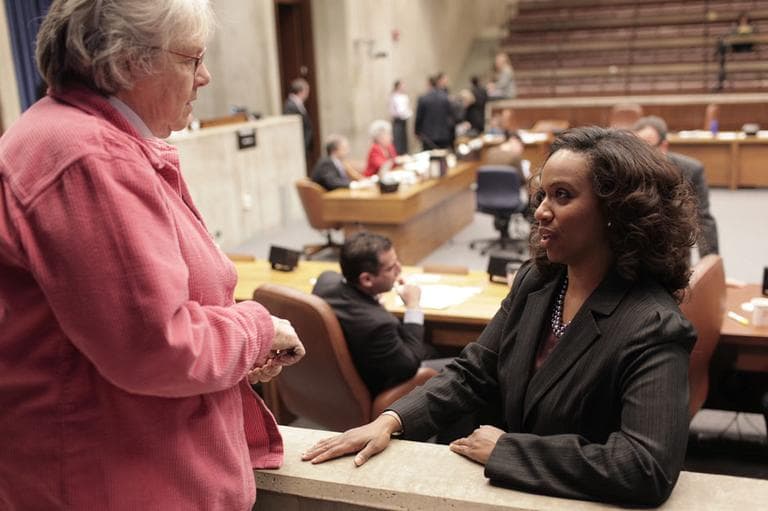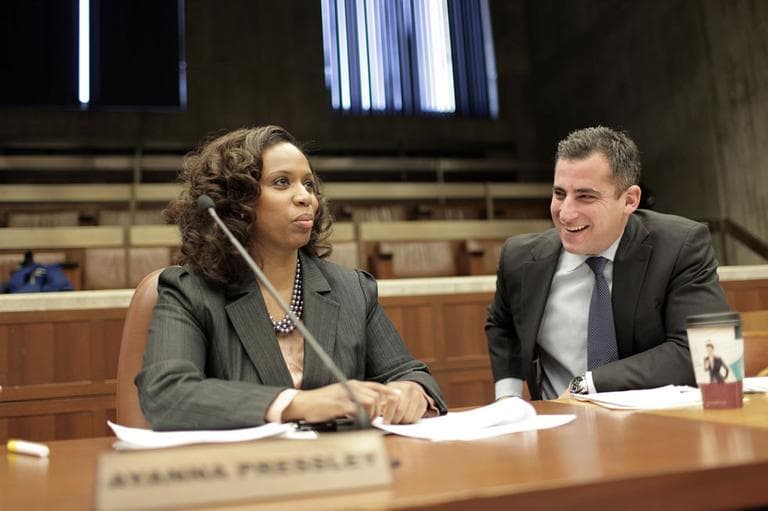Advertisement
Pressley Is A Compelling, But Vulnerable Councilor
Resume
On Tuesday voters in Boston's Roxbury neighborhood vote in a special primary to fill the Boston City Council seat left open by Chuck Turner, who was convicted on a felony bribery charge last October. Turner, who is black, portrayed his conviction as racially motivated.
So in December, when the council moved to oust Turner, all eyes were on the handful of black and Latino councilors to see how they would vote. Ayanna Pressley — the first African-American woman to win a seat on the council — voted to remove Turner. This and other decisions have made her one of the most interesting political figures in Boston, but also one of the most vulnerable.
When interviewed recently, Pressley didn't want to talk about Turner. She said she wants to move on. After all, the audience booed and hissed when she voted to remove him from the council. And she's still feeling the repercussions.
She says the day after the vote, she was at the doctor's office when a family approached her. "They said that I was a disgrace to the community and they were ashamed that they ever told their daughter that I was a role model," Pressley said. "So, it's been very hard."
She says many people ask why she didn't just abstain.
"I would have thought it cowardly to abstain," she said. "[Turner's] sort of been the embodiment of make a stand, and stand firmly even when unpopular. Ultimately, I cast the ballot that I did because despite how hard it was, I thought it was the right thing to do in maintaining the integrity of the body and so as not to imperil my agenda."
And that agenda isn't an easy sell. It's provocative and makes some people uncomfortable.
Recently, Pressley spoke about improving sexual health education in Boston Public Schools at a monthly meeting of the Black Ministerial Alliance. About 20 ministers sat in the basement of a Roxbury church eating eggs and grits. Pressley was wearing her uniform — a black suit, pearls and stilettos — and talking about condoms and STDs.

"What I want to say is that black and brown girls disproportionately are...you know, have chlamydia and gonorrhea," she said.
The room was silent.
"So they are having sex. I'm advocating for increased condom availability. Not distribution. I would never advocate for condoms in a bowl in a rec room. That would be irresponsible."
Pressley says politicians have warned her against taking on a controversial issue like sexual education during an election year. Just as they warned her away from certain topics during her campaign.
"I was advised by many — some solicited and much of it not — to stop talking about girls," she said. "To stop talking about my past, or outright was told, 'Discuss that in rooms of color but don't talk about that stuff in front of other rooms.' "
Specifically, people told her not to speak about her history as a "survivor of sexual abuse or sexual assault" because it "makes men uncomfortable."
She says she was told not to talk about her commitment to girls because "that's not a city-wide issue that will resonate."
According to Pressley, she was advised, "broaden your portfolio, or white people won't vote for you."
Instead, Pressley developed her own philosophy. She gave the same stump speech, no matter what side of town she was on. Everyone heard how she was raised by a single mom, that her father was in prison most of her childhood, how she dropped out of college to work full-time and support her mother, who had been laid-off.
It's not just the content that's surprised people. It's also Pressley's style.
Last summer, Pressley held a hearing on street violence. Normally, at a hearing like this, officials would do most of the talking. The city councilors would all make statements, and there would be just a few minutes left for the audience to speak.
Pressley turned this formula on its head. She silenced the officials in the room and gave the floor to mothers, grandmothers and siblings of people killed or injured because of street violence. It lasted four hours.
"Listening is something, as elected officials, as leaders, we forget to do," she told the audience.
"Her approach is a little more refreshing, more encouraging, and more inspiring than my own even," said City Councilor Mike Ross. He sat next to Pressley for the full four hours.
The hearing led to some concrete changes. For example, the Boston Medical Center created a space where families could go to grieve in private. That's a big deal, since that hospital's emergency room treats most of the city's gunshot victims.
But that's not enough for some.
"I'm just waiting for the big motions. You know, I want the laws," said Michael Ball, a political blogger in Hyde Park. He's followed Pressley since the campaign, and says she's too focused on big-picture problems.
"You know, she's very bright. But I think she needs to focus more on some goals; bring things to fruition," he said.
Pressley is familiar with criticism like this.
"People close to me, personally, politically, have expressed frustration that I'm not the political animal that they wish that I were," she said. She says they wish she was more "self-promoting" and "less collaborative."
Pressley's political philosophy will be put to the test this fall. Political observers say she's the most vulnerable person on the council. She came in last among the people who won the four city-wide seats. And now, there's a rumor that former mayoral candidate Michael Flaherty plans to jump into the race... and would likely knock her out.
If she can win this fall, her backers see her going far, running for mayor or even a U.S. Senate seat.
This program aired on February 15, 2011.